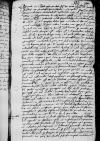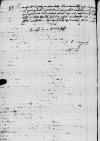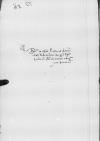Letter #2012
Ioannes DANTISCUS to Tiedemann GIESEHeilsberg (Lidzbark), 1538-12-09
English register:
Dantiscus presents his position on the advice of the Voivode of Marienburg (Malbork) [Georg von Baysen (Jerzy Bażyński)] regarding the tax. He would agree to retaining the tax until the next [Royal Prussian] Diet if all [the Prussian councillors] were unanimous, but since they are not, he intends to follow the royal decree to the letter and send the tax money to Marienburg as soon as possible.
In the face of a lack of concern for public affairs on the part of the majority [of the councillors], Dantiscus expresses apprehension about the future of [Prussian] privileges and immunities when the now aged Voivode [of Marienburg] dies. He anticipates he will be unable to defend them without his support.
Dantiscus is grateful to Giese and the Voivode for their sympathy, but he does not think it necessary for them to intervene at the royal court until he receives a reply to his letter [IDL 2001]. He suggests that copies of the [Royal Prussian Council’s] letters to the King [Sigismund I Jagiellon] from the latest Graudenz (Grudziądz) Diet regarding the issue of the contribution should be sent out to the voivodes. If Giese would kindly do that, he would make it easier to reference that letter if it became necessary to stand in Dantiscus’ defence.
Dantiscus has learned that the parish priests from Löbau (Lubawa) and Kazanice(?) (Casnicensis) are demanding that the church administrators [in Kulm (Chełmno)] return the money once provided by the fraternity of priests for rebuilding the church after the fire which affected the town during Dantiscus’ pontificate. Dantiscus considers their demands unjustified.
Manuscript sources:
Prints:
| ||||||||
Text & apparatus & commentary Plain text Text & commentary Text & apparatus
Reverendissimo in Christo Patri et Domino, domino
Reverendissime in Christo Pater et Domine, frater et amice carissime et honora[n](de) or honora[n](dissimee)⌈honoran paper damaged⌈[n]n paper damaged⌉(de)honora[n](de) or honora[n](dissimee)⌉ .
Salutem et studiosam commendationem.
Consilium magnifici domini
Proinde omnem contributam pecuniam, cuius ne assem quidem sum visurus, cum primis
Ceterum, quod Dominatio Vestra Reverendissima cum domino
Cum superioribus annis in sede essem Dominationis Vestrae Reverendissimae,[3] post conflagratum  BCz, 245, p. 110 infectacf. Pl. Am. 885 ea quae sunt facta infecta ut reddat clamitat ⌋. Quae in societate illa sacerdotum erant deposita, in pios quidem usus et non privatos cedebant. Nisi fuisset ea pecunia et nescio quid ex me adminiculi, adhuc omnia in loco ecclesiae plena essent ruderibus.
BCz, 245, p. 110 infectacf. Pl. Am. 885 ea quae sunt facta infecta ut reddat clamitat ⌋. Quae in societate illa sacerdotum erant deposita, in pios quidem usus et non privatos cedebant. Nisi fuisset ea pecunia et nescio quid ex me adminiculi, adhuc omnia in loco ecclesiae plena essent ruderibus.
Dominatio Vestra Reverendissima feliciter valeat.
Ex
Eiusdem Dominationi Vestrae Reverendissimae deditissimus


